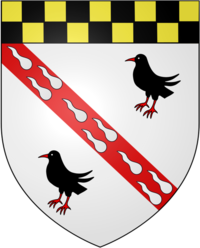Gabriel Pleydell
Almost always a defendant in court, known allegations include the forced expulsion of residents from a country manor, forcible entry into and seizure of goods from a private property, unlawfully protecting convicts from justice, forging documents for his own benefit, and illegal hunting.
Legal accusations for most of his political career and imprisonment in Fleet Prison and the Tower of London helped "confirm for Gabriel Pleydell a niche in parliamentary history", according to a modern historian.
[6] The Pleydell family were thought to descend from Thomas de Coleshill, a knight who was awarded lordship of the eponymous parish on 2 March 1275 by King Edward I.
[18] Pleydell's initial entrance to the Parliament of England in March 1553 as a member for the market town of Wootton Bassett was, at least in part, made possible by his status as a wealthy landholder.
Although he had not yet inherited the lease on the family estate of Midgehall, his purchases of land and property surrounding the manor (one mile from the constituency)[g] in 1561 and 1562 suggest that his assets facilitated a seat in the House of Commons.
[3] Succeeding members John Seymour and Robert Huick from the 1547–52 session,[i] Pleydell served with William Garrard for just 30 days in March until a dissolution of Parliament.
His appointment was made possible by the patronage of former Member for Marlborough Sir John Thynne, an eminent figure in Wiltshire politics who was the county's custos rotulorum for at least 20 years.
Toward the end of the reign of King Edward VI, he brought a charge in the Star Chamber against several men who forced his expulsion from the manor house at Withington, Gloucestershire that he was leasing.
Both were found innocent of breaching the peace and claimed to have acted at the reasonable request of their employer, Anne Seymour; undue interference with judicial proceedings was ruled out.
[3] Around the same time, Pleydell was sued for forcible entry and illegal seizure of property at Little Bedwyn (with similar offences at Collingbourne Ducis) but claimed to be acting on the failure of the plaintiff to punctually pay rent.
[3][4] A fervent supporter of Sir Anthony Kingston in the House of Commons, Pleydell came to be associated with Sir Henry Dudley's plot to exile Mary and ensure the succession of the future Queen Elizabeth to the throne (a foiled venture which led to Kingston's unexplained death and Dudley's voluntary exile to France);[33][34] the Star Chamber accused Gabriel of inciting riots opposing Mary's reign.
[3] At his release Pleydell told the Privy Council that he was punished for "speaking his conscience ... in a bill concerning the commonwealth",[38] an opinion he subsequently echoed abroad.
[38] Berwick, assumed by the historian Stanley Thomas Bindoff to be acting out of jealousy, was the previous holder of the titles and involved in a dispute with Pleydell over the rights to property near the forest.
[38] Pleydell enlisted the aid of serving and former members of parliament, including William Button, Henry Clifford, Griffith Curteys and John Hooper, in July.
[38] This, in addition to breaching a commitment to meet regularly with the Privy Council under recognizance after his imprisonment, led to his indictment by Attorney-General Edward Griffin during the Michaelmas term.
Although the circumstances of many are unknown, a significant suit was initiated by Member for Chippenham Francis Newdigate at the start of the 1563 parliamentary session, when Pleydell is known to have been in a considerable amount of debt.
Cordell's involvement as an official of the judiciary may indicate that Pleydell had again claimed parliamentary privilege against Newdigate's allegations, since the case was heard in the Court of Chancery while he was a sitting Member for Wootton Bassett.
Assigning themselves his properties in Chippenham, the couple (described by Alison Wall in the Oxford Dictionary of National Biography as "scoundrels"[43] and by R. J. W. Swales as "unscrupulous adventurers")[44] directed Baynton's money and estates to themselves, contrary to his intended entailment of the assets to his brother Edward.
[38] Pleydell released any titles inherited from the acquired estates, which included the manors of the Clench and Stanley hamlets, to Edward Baynton (Andrew's brother) on 19 July 1566 and the Privy Council therefore rejected allegations of forgery against him.
He was again accused of similar offences years later, and the prosecution called Pleydell and his accomplices "persons of long time acquainted with such lewd devices and practices".
The remainder was gifted to Agnes, his only daughter and sole executrix; she paid the document's overseers, Richard Danvers and Gabriel's nephew Robert Wells, 20 shillings for their services.





